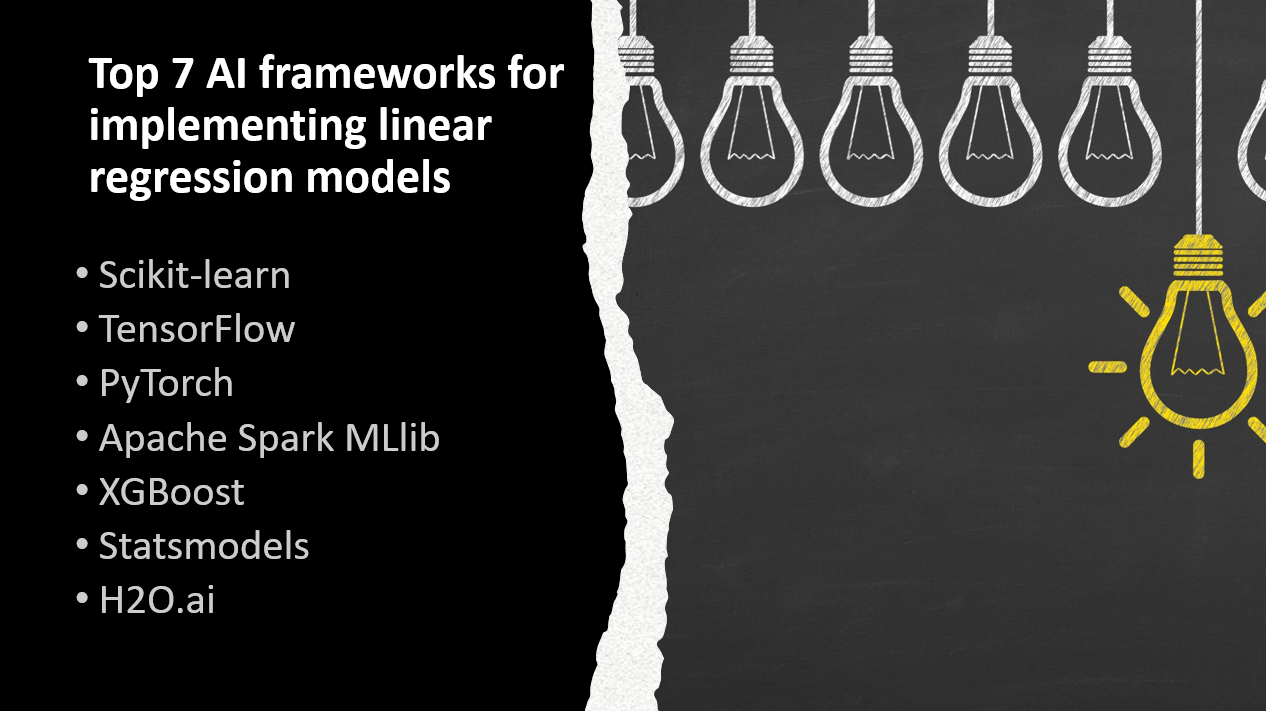
Introduction
Linear regression is a fundamental supervised machine learning algorithm used for predicting continuous numerical values based on input features. AI frameworks offer efficient and scalable implementations of linear regression models, making them essential tools for various data analysis tasks. In this blog post, we will explore the top seven AI frameworks for implementing linear regression models, empowering data scientists and researchers to perform accurate predictions and gain insights from their data.
Importanve of AI frameworks for implementing linear regression models?
- AI frameworks optimize linear regression algorithms for fast computation.
- AI tools automatically select relevant features, improving model accuracy.
- AI frameworks automate model training, evaluation, and hyperparameter tuning.
- AI platforms can handle large datasets for implementing linear regression models.
- AI frameworks allow customization of linear regression models for specific use cases.
Related Reading:
Here Are Our Top 7 AI frameworks for implementing linear regression models:
1: Scikit-learn
Overview and Importance
Scikit-learn is a popular and widely-used Python library for machine learning, including the implementation of linear regression models. It provides a rich set of tools and functions that facilitate the development of various machine learning algorithms, making it an essential tool for data scientists, researchers, and developers.
Key Features and Capabilities
Linear Regression Implementation
- Scikit-learn offers easy-to-use functions to build and train linear regression models, both for simple linear regression and multiple linear regression.
Preprocessing and Feature Engineering
- The library provides data preprocessing utilities, such as feature scaling, handling missing values, and transforming categorical variables, which are crucial for preparing data before applying linear regression.
Model Evaluation and Metrics
- Scikit-learn includes a comprehensive set of metrics to assess the performance of linear regression models, enabling users to evaluate accuracy, mean squared error, and other performance indicators.
2: TensorFlow
Overview and Importance
TensorFlow is a powerful open-source AI framework that supports the implementation of various machine learning models, including linear regression. It is widely recognized for its scalability, flexibility, and extensive community support, making it a top choice for both researchers and practitioners in the field of machine learning.
Key Features and Capabilities
Linear Regression Implementation
- TensorFlow provides a high-level API and low-level operations that allow users to build and train linear regression models with ease.
GPU Acceleration
- TensorFlow supports GPU acceleration, enabling faster training of linear regression models, especially for large datasets with high-dimensional features.
Distributed Computing
- TensorFlow supports distributed computing, making it efficient for training linear regression models on multiple machines and handling large-scale datasets.
Related Reading:
3: PyTorch
Overview and Importance
PyTorch is a popular AI framework that has gained significant traction for implementing linear regression models. Its dynamic computational graph, intuitive interface, and extensive library support make it a preferred choice for researchers and developers working on linear regression tasks.
Key Features and Capabilities
Linear Regression Implementation
- PyTorch offers a flexible and straightforward approach to building and training linear regression models, enabling users to experiment with various architectures and optimization techniques.
GPU Acceleration
- PyTorch supports GPU acceleration, facilitating faster training and inference for large-scale linear regression tasks with high-dimensional data.
Automatic Differentiation
- PyTorch provides automatic differentiation capabilities, making it easier to compute gradients for optimization during the training process of linear regression models.
4: Apache Spark MLlib
Overview and Importance
Apache Spark MLlib is a powerful AI framework that offers distributed computing capabilities for implementing linear regression models at scale. It is designed to handle large datasets efficiently, making it suitable for big data linear regression tasks in various industries.
Learn more about Apache Spark MLlib
Key Features and Capabilities
Distributed Computing
- Spark MLlib leverages the power of distributed computing to perform linear regression on large datasets, taking advantage of distributed resources and parallel processing.
Robust Algorithms
- It provides robust and optimized linear regression algorithms that can handle high-dimensional data and deliver accurate predictions.
Integration with Apache Spark
- Spark MLlib is fully integrated with the Apache Spark ecosystem, enabling seamless integration with other Spark components and libraries for end-to-end data processing and analysis.
5: XGBoost
Overview and Importance
XGBoost (Extreme Gradient Boosting) is a popular AI framework known for its exceptional performance in various machine learning tasks, including linear regression. It is an optimized and efficient implementation of gradient boosting algorithms, making it suitable for handling large-scale linear regression problems.
Key Features and Capabilities
Gradient Boosting
- XGBoost employs gradient boosting techniques to iteratively build a linear regression model by minimizing the loss function and enhancing prediction accuracy.
Regularization
- It offers L1 and L2 regularization to control overfitting and improve the generalization of the linear regression model.
Handling Missing Values
- XGBoost can handle missing data in the input features, reducing the need for extensive data preprocessing and imputation.
Related Reading:
6: Statsmodels
Overview and Importance
Statsmodels is a powerful Python library that specializes in statistical modeling and hypothesis testing. It is widely used for implementing linear regression models and other statistical analyses in various domains, including economics, finance, social sciences, and more.
Key Features and Capabilities
Comprehensive Statistical Functions
- Statsmodels offers a wide range of statistical functions for regression analysis, including linear regression, logistic regression, time-series analysis, and more.
Detailed Statistical Summary
- It provides detailed statistical summaries of the model, including coefficients, p-values, R-squared, and other relevant statistics, aiding in model interpretation and evaluation.
Robust Statistical Tests
- Statsmodels includes various statistical tests to assess the assumptions of linear regression models and identify potential violations, ensuring the reliability of the regression analysis.
7: H2O.ai
Overview and Importance
H2O.ai is an open-source machine learning platform known for its scalability and performance. It is widely used for implementing linear regression models and other machine learning algorithms in large-scale, distributed environments. H2O.ai's distributed architecture allows it to handle massive datasets efficiently, making it a popular choice for various data-intensive applications.
Key Features and Capabilities
Distributed Machine Learning
- H2O.ai supports distributed machine learning, allowing users to train linear regression models and other algorithms on large clusters of machines, accelerating model training and inference.
AutoML Capabilities
- The platform offers AutoML functionality, enabling automated model selection and hyperparameter tuning, simplifying the process of building accurate linear regression models.
Production-Ready Deployment
- H2O.ai provides production-ready deployment options, allowing users to easily deploy trained linear regression models in real-world applications for prediction and inference.
Conclusion
AI frameworks are essential for accurate linear regression models, enabling data practitioners to make informed decisions and gain valuable insights. The top seven frameworks for this purpose are Scikit-learn, TensorFlow, PyTorch, Apache Spark MLlib, XGBoost, Statsmodels, and H2O.ai. The selection of the appropriate framework depends on data size, complexity, and deployment requirements. Data practitioners should explore these AI frameworks to leverage their linear regression implementations and optimize their decision-making processes effectively.
